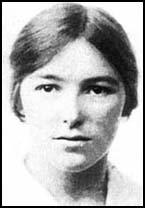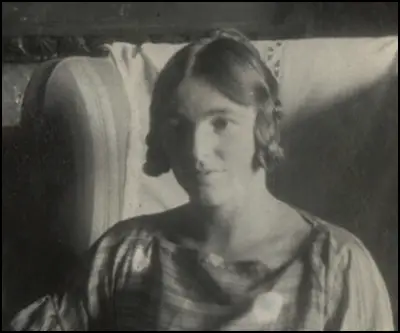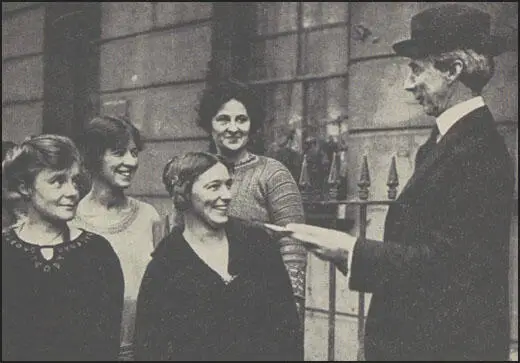Dora Russell

Dora Black, the daughter of Frederick Black, a senior Civil servant, was born in London on 3rd April 1894. Black held strong progressive views and believed that girls had the right to as good an education as boys. Dora responded well to her father's encouragement and won scholarships to Sutton High School and Girton College, Cambridge. At university she gained a first-class honours degree in modern languages.
Dora met Bertrand Russell in 1916 and soon afterwards he asked her to marry him. Dora's feminism involved a belief in sexual freedom and although she was willing to live with Bertrand, she rejected his proposal of marriage. Dora saw marriage as a restriction on women's liberty, and although Bertrand accepted her philosophical argument on the subject, he wanted a son and legitimate heir to the family title.
In the First World War Dora joined Russell's campaign against military conscription. After Russell was released from Brixton Prison in 1918 for his role in the struggle against the Military Service Act. Dora and Bertrand visited Russia and China together.
When they returned to England in 1921 Dora agreed to marry Bertrand Russell. After giving birth to her first child Dora became involved in the birth control movement.

The 1923 Dora along with Maynard Keynes, paid for the legal costs to obtain the freedom of Guy Aldred and Rose Witcop after they had been found guilty of selling pamphlets on contraception. The following year, Dora, with the support of Katharine Glasier, Susan Lawrence, Margaret Bonfield, Dorothy Jewson and H. G. Wells founded the Workers' Birth Control Group. Dora also campaigned within the Labour Party for birth-control clinics but this was rejected as they feared losing the Roman Catholic vote.
Dora Russell did a considerable amount of writing during this period. With Bertrand she wrote The Prospects of Industrial Civilization (1923) and two years later she published her book, Hypatia: Women and Knowledge. The book was severely attacked by people who disapproved of Dora's theories on sexual freedom for women.

In 1927 Dora and Bertrand Russell opened their own progressive boarding school, Beacon Hill, near Harting, West Sussex. The school reflected Bertrand's view that children should not be forced to follow a strictly academic curriculum. Other aspects of the school illustrated Dora's ideas on education. The school was run on the principle that freedom, if understood early enough, would result in maturity and self-discipline. Dora also emphasized co-operation rather than competition and believed that the best way to teach the benefits of democracy was to run the school on democratic lines. Dora's educational philosophy was expressed in her book In Defence of Children (1932).
Both Bertrand and Dora continued to have sexual relationships with other partners. This resulted in Dora having two children with the journalist, Griffin Barry. In 1935 Bertrand Russell left Dora for one of his students, Patricia Spence. When Barry returned to the United States, Dora continued to run Beacon Hill School on her own until the Second World War when she went to work for the Ministry of Information.
Dora was active in the peace movement after the war and in 1958 joined with Bertrand Russell, J. B. Priestley, Vera Brittain, Fenner Brockway, Victor Gollancz, Canon John Collins and Michael Foot to form the Campaign for Nuclear Disarmament (CND). Later that year Dora organised the Women's Caravan of Peace and toured with it through much of Europe.
After retiring to Cornwall in 1962, Dora wrote Religion and the Machine Age (1982) and three volumes of autobiography, The Tamarisk Tree (1977, 1981, 1985).
Dora Russell died on 31st May, 1986.
Primary Sources
(1) Dora Russell, The Tamarisk Tree (1975)
I accordingly went up to Girton College, Cambridge. Architecturally rather hideous, Girton was commodious and also, in its way, homely. At study of your own and an adjoining bedroom separated either by doors or a curtain, gave you a feeling of privacy and the dignity of being grown-up. Girton, even more than Newnham, was like a large girls' boarding school. Intellectually we were reckoned to be adult, but as young inexperienced women we had to be guarded with care. You could not receive a young man in your room; you might be permitted to have him to tea in one of the public reception rooms, but you could accept no invitation from young men to tea or other entertainment without a chaperone from the College.
Miss Jex Blake, a classics don, who was thoroughly robust and rather like a horse; this is not unkindly meant, for I liked and respected her. She had a great sense of humour.
Eileen Power dealt with history. She became distinguished for her fine scholarship and her utter charm, which captivated many of both sexes. We always found it a pleasure to watch her, tall and placid and very much a personality, as she came in to take her place for dinner at high table. She had very beautiful, candid blue-grey eyes.
(2) Dora Russell, The Tamarisk Tree (1975)
My first impression of him (Bertrand Russell) was that he was exactly like the Mad Hatter. The thick and rather beautiful grey hair was lifting in the wind, the large sharp nose and odd tiny chin, the long upper lip were outlined against the sky; of middling height, lean and spare, he moved with impetuous energy, but jerkily, not with the grace of an athlete.
(3) Dora Russell, The Tamarisk Tree (1975)
Marie Stopes had established the first birth control clinic in Britain; the whole question of informing women, especially those who were poor, about methods of contraception, began to be discussed. Early in 1923, Rose Witcop and Guy Aldred, both on the left politically, were selling cheaply a pamphlet by Margaret Sanger explaining about sex and contraception in terms which, it was thought, uneducated women could understand. The police seized the pamphlet for destruction as obscene. The report of this made me exceedingly angry, for I could not see why information which a middle-class woman could get from her doctor should be withheld from a poorer woman who might need it far more. Bertie agreed with me that we should take some action; I contacted Maynard Keynes, who agreed to go surety with me for an appeal.
(4) Bertrand Russell, was the Labour Party candidate at Chelsea in the 1924 General Election. In her autobiography, The Tamarisk Tree, Dora Russell explains why she believes Labour lost the election.
The Daily Mail carried the story of the Zinoviev letter. The whole thing was neatly timed to catch the Sunday papers and with polling day following hard on the weekend there was no chance of an effective rebuttal, unless some word came from MacDonald himself, and he was down in his constituency in Wales. Without hesitation I went on the platform and denounced the whole thing as a forgery, deliberately planted on, or by, the Foreign Office to discredit the Prime Minister.
(5) In her autobiography, Dora Russell describes a visit to the Nursery School founded by Margaret McMillan.
We took John and Kate to spend half a day at the McMillan open-air nursery school, and we talked about her and studied her ideas in action. We studied the Montessori material, much of which was to teach number, reading and writing, we thought too rigid; we preferred the McMillan style of providing the child with all kinds of materials by means of which it would find its own way. Nor did we think it was necessarily a good thing for a child to read and become bookish and academic too early. This is a period of doing, feeling, observing the world and his fellow citizens - the concrete over the abstract - apparently almost completely lost to sight by our planners today, when it seems that children are to be stimulated to read, write and do sums even before they leave the nursery school.
(6) Crystal Eastman, Equal Rights (8th June, 1926)
And who is Dora Black? When I came to England in 1919 I met her at Cambridge - a slender, vivacious, dark-eyed girl with the reputation for being brilliant and unusual. She was then considering, I remember, whether she should go on with the scholastic career, which seemed to be opening up for her, or abandon it and try to make her living as an actress. A short time after this she became Bertrand Russell's secretary, then his wife, and the mother of his two children.
Mrs. Russell is 31 years old now, and seems to have given up all thoughts of the stage and of the scholar's life in which she had made so fine a beginning. However, she has by no means retired into obscurity. Although her children are but two and four she has found time to stand for Parliament; she is the secretary and active leader of the Workers' Birth Control Group which is doing such splendid work in forcing this issue on the attention of the Labour Party; and she has begun to write books.
(7) In her autobiography, Dora Russell describes the setting up of Beacon Hill in 1927.
Measures of self-government and a school council, especially for such young children, were a great innovation. Democracy can only spring from practising it early, and democratic action was not to expected from young people brought up under a close authoritarian system. According to our view, freedom given and understood early enough would result in a natural evolution to maturity and self-discipline. Severity and repression of the old type, however, almost certainly carried with it in adolescence, disturbance, confusion and the necessity of revolt.
Following the rise of the Labour Party it seemed reasonable, in 1927, to expect, or at least hope, that co-operation for the common good might gradually replace the competitiveness of capitalism. Hence we did not foster competition in our school, on the contrary. Nor is it true that children are naturally competitive, unless egged on to be so. Physical punishment was, of course, not permitted, and we sought to mitigate aggression among the children themselves. If an adult uses violence on a child, the child will naturally assume that he too, has the right to use it on one smaller or weaker.

